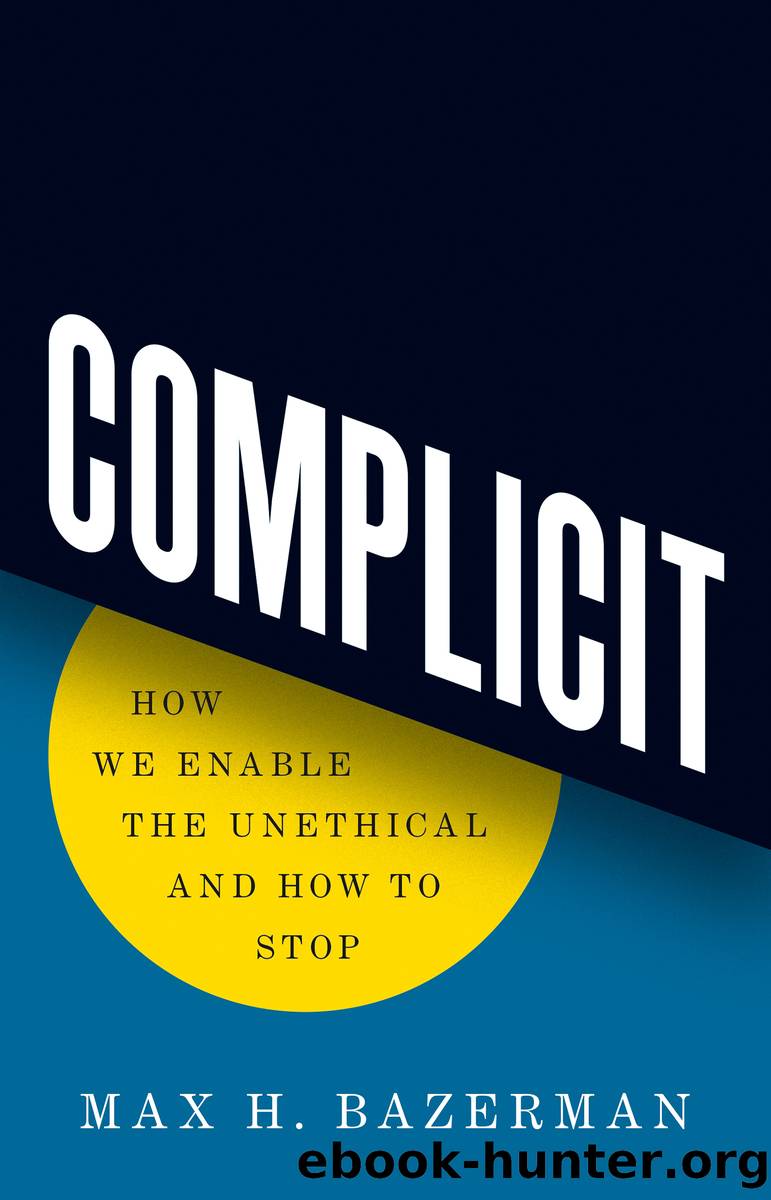Complicit by Max H. Bazerman

Author:Max H. Bazerman
Language: eng
Format: epub
Publisher: Princeton University Press
Published: 2022-07-19T00:00:00+00:00
The Value and Challenge of Trust
Choosing to trust the people who surround you creates enormous opportunities in life. By trusting your colleagues, you can accomplish so much more for your organization than if you spent time rechecking all of their work or held back from sharing important information with them. Developing trust also helps us build relationships that can be key to our happiness. Thus, any concerns we may have about becoming complicit as a result of our trust in others need to be balanced against the benefits of trusting them.
One challenge associated with this balancing act is that the cues that something is wrong are typically ambiguous. When you see hints that something is wrong, it is possible that you are seeing smoke when there is no fire. Further investigation might show that no harm was done, and you could end up offending people you care about by showing your lack of trust. In academia, given all of the challenges to ensuring the integrity of data in the social sciences, I think it would be healthy if we changed our norms to make it standard for authors to expect greater documentation of the work of their coauthors, without anyone taking offense in the process.
In an important paper on trust, organizational scholars Roger Meyer, Jim Davis, and David Schoorman highlight the power of distinguishing trust based on three different attributes of a person: their ability, their benevolence, and their integrity.10 The scholars highlight that when you say âI trust youâ to someone, that can mean that you trust the person to have the competence to complete a task (ability), the generosity required to meet their commitment (benevolence), or the intention of completing a project in an honest manner (integrity). It is easy to recall episodes in life where we trusted people based on each of these three different qualities.
Being trusting is generally a good thing. We view people who are not trusting with suspicion. It is awkward to reveal that you do not trust someone; it sounds like an accusation and can threaten the relationship. But trust can also lead to System 1 thinking, or the habit of intuitively relying on information provided by others even when we receive signals that there might be reason for concern. And, as I highlighted in chapter 3, we may be biased toward over-trusting people who are part of groups we belong to, such as our work team or our coauthors.
I trusted both the ability and the integrity of my coauthors on the 2012 paper. Reflecting on my history of interactions with my many past coauthors, I find that the only times in my career when I didnât trust a coauthorâs ability were when I was mentoring a relatively new doctoral student on one of their first projects. In those cases, I would carefully review their work since they might not yet have had the skills to conduct the technical pieces of a project correctly. However, I have never paused to question the integrity of data provided by a coauthor.
Download
This site does not store any files on its server. We only index and link to content provided by other sites. Please contact the content providers to delete copyright contents if any and email us, we'll remove relevant links or contents immediately.
| Ethics | Etiquette |
| Fashion & Image | Health & Stress |
| Motivation & Self-Improvement | Work Life Balance |
| Workplace Culture |
Tools of Titans by Timothy Ferriss(8346)
Change Your Questions, Change Your Life by Marilee Adams(7717)
Deep Work by Cal Newport(7040)
Playing to Win_ How Strategy Really Works by A.G. Lafley & Roger L. Martin(6178)
Man-made Catastrophes and Risk Information Concealment by Dmitry Chernov & Didier Sornette(5980)
Digital Minimalism by Cal Newport;(5739)
Big Magic: Creative Living Beyond Fear by Elizabeth Gilbert(5721)
The Slight Edge by Jeff Olson(5393)
Ego Is the Enemy by Ryan Holiday(5390)
The Motivation Myth by Jeff Haden(5190)
The Laws of Human Nature by Robert Greene(5134)
Stone's Rules by Roger Stone(5065)
Tuesdays with Morrie by Mitch Albom(4753)
Eat That Frog! by Brian Tracy(4499)
Rising Strong by Brene Brown(4431)
Skin in the Game by Nassim Nicholas Taleb(4223)
The Money Culture by Michael Lewis(4173)
Bullshit Jobs by David Graeber(4161)
Skin in the Game: Hidden Asymmetries in Daily Life by Nassim Nicholas Taleb(3973)
